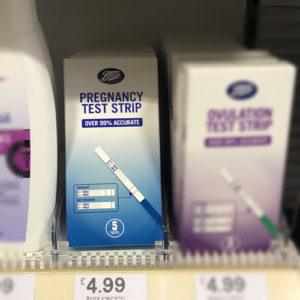Women experience different symptoms during pregnancy. Some symptoms affect more women than others and in different ways. A missed or delayed period is one of the most important pregnancy symptoms for the majority of women.
It is essential to understand the different pregnancy symptoms and signs as some can be related to other issues. Some women have the first experiences just a week or two after conceiving but many feel nothing for weeks and up to a month after conception.
Watch Out for These 10 Early Symptoms of Pregnancy
The early pregnancy symptoms including headaches, nausea, the lower back aching, the breasts becoming tender and missing a period. You should take a home pregnancy test if you suffer from these symptoms and are sexually active.
1. Spotting
When the egg implants in the uterus, it can cause a small amount of bleeding, commonly referred to as spotting. This happens between six and 12 days after conceiving and can also occur with some cramping. This doesn’t happen for all women — if you don’t see it, it doesn’t mean you’re not pregnant. However, this bleeding can occur for the following reasons: a change in menstruation or your actual menstruation, an infection, a change to your birth control or abrasion during intercourse.
2. Changes to Your Menstruation
A missed period is one of the most common symptoms that women suffer from and leads them to test for pregnancy. You should miss your next period but some women find that they bleed during this time. If you do bleed, it will usually be lighter or shorter than your usual period.
Changes to your menstruation occur for other reasons, including fatigue, stress and tension, stopping or missing birth control, hormonal issues, excessive loss or gains in weight, breastfeeding and illness.
Understanding Pregnancy Symptoms
The early signs of pregnancy can sometimes be confusing. It’s important to remember that many symptoms could be caused by other factors. Don’t panic if you experience something unusual. Take a test to confirm. Some women rely on tracking their menstrual cycle and identifying ovulation to recognise pregnancy signs. But cycles can vary month-to-month, so this isn’t foolproof. The only way to know for sure is with a test. Don’t be disappointed if pregnancy symptoms don’t show up right away. It takes time for hormonal changes to build up. Every woman and every pregnancy is different.
Tracking Your Cycle
While waiting to take a pregnancy test, many women find it helpful to track their menstrual cycle. Apps and calendars can help you pinpoint ovulation and your fertile window. Keep an eye out for changes in cervical mucus — it often becomes clearer and stretchier around ovulation. Basal body temperature tracking is another useful tool, as it typically rises slightly after ovulation. However, remember that cycle tracking isn’t foolproof. Stress, illness, and other factors can throw off your usual patterns. If you’re actively trying to conceive, consider using ovulation predictor kits for more precise timing. Always pair tracking methods with a reliable pregnancy test for confirmation.
Listen to Your Body
Pay attention to what feels normal or abnormal for you. Subtle changes can be an early tip off. But don’t obsess over analysing every twinge. It’s easy to imagine symptoms when you want to be pregnant.
Look for patterns over time rather than jumping to conclusions from isolated incidents. Your body may provide hints, but no single symptom can confirm pregnancy.
3. Suffering from Tender and Swollen Breasts
Tender or swollen breasts can occur just a week or two after conceiving. They could be sore to touch or clothes may become irritable. They may also swell due to hormonal changes and water retention.
However, changes to the breasts can happen for many other reasons, including pre-menstrual, a change or side effect from your birth control pill or an imbalance in your hormone levels.
What Does Implantation Bleeding Look Like?
The spotting that sometimes happens with implantation is usually light pink or brown. It may resemble the end of a period. The amount is also light, sometimes just requiring a panty liner.
Implantation bleeding typically lasts 1-2 days and occurs 6-12 days after fertilisation. But not all women experience it. Don’t worry if you don’t notice any spotting.
4. Tiredness and Fatigue
Pregnancy is a tiring time and feeling extra tired or fatigued can occur within the first week of conceiving. However, tiredness and exhaustion happens for many other reasons on a daily basis. Some include being ill, such as the flu or a common cold, depression, stress or trouble sleeping.
If you are pregnant, the feelings of tiredness and exhaustion are particularly strong in the first 12 weeks of pregnancy. The hormones in your body are causing you many changes in your body — you will feel emotional, nauseous and exhausted. The only way to cope with this will be to try and rest as much as possible. Put your feet up when you can. Your partner can help by taking on jobs that may wear you out. You may feel low at times, this will be a result of you feeling run down and tired. Eating a healthy diet and getting lots of sleep can help in this respect.
Coping with Pregnancy Fatigue
Fatigue hits fast, starting around week 6. Hormones like progesterone have soothing effects. Plus your body works hard supporting foetal development.
Listen to your body and rest when needed. Take short naps, go to bed earlier, or sleep in when possible. Light exercise can boost energy without overdoing it.
Eat frequent small meals and snacks to maintain blood sugar. Stay hydrated and limit caffeine to keep fatigue from worsening. Don’t push yourself to exhaustion.
5. Pregnancy Sickness and Nausea
This is one of the most well-known symptoms in pregnancy and usually appears between two and eight weeks after conceiving. A small number of women don’t suffer from this at all while some can suffer from pregnancy sickness at all times of the day and throughout the pregnancy. Nausea happens for many reasons including changing your birth control, stomach illnesses, food poisoning and stress.
Breast and Nipple Changes
Increased blood flow and hormones stimulate breast growth early on. Tenderness, fullness, and tingling sensations are common. Nipples may also stick out or become sensitive.
Don’t squeeze breasts to check for changes. This can lead to mastitis later on. Gentle massage with oil can help relieve soreness. Wear a supportive bra, avoid irritating fabrics, and skip underwires.
6. Pain in the Lower Back
Pain in the lower back is common in early pregnancy but many women experience a dull ache for their whole pregnancy. This can also happen for reasons such as back issues, pre-menstrual, strains or stress.
Almost 50% of women will suffer from back pain as a result of pregnancy. This symptom occurs because your body is getting itself ready for birth. Your ligaments and joints are loosening up and your body knows that you will need to deliver a baby.
7. Onset of Headaches
Pregnancy can bring on headaches that’ll make you want to crawl under the covers. These aren’t your run-of-the-mill tension headaches, either. Hormonal changes are often the culprit, turning your head into a percussion section. If you’re suddenly reaching for pain relievers more often, it might be time to consider a pregnancy test. But don’t panic – there are plenty of natural remedies to try, like cold compresses or a bit of gentle yoga to ease the tension.
8. Needing to Urinate Often
You might find yourself becoming best friends with every bathroom in town. This frequent urge to pee isn’t just annoying – it’s your body’s way of dealing with increased blood flow to your kidneys. They’re working overtime, processing extra fluids that’ll eventually support your growing baby. Don’t be surprised if you’re up at night for a bathroom run or two. It’s nature’s way of prepping you for those middle-of-the-night feedings!
9. The Areolas Darken
Your areolas might decide to go a shade or two darker, like they’re getting a tan all on their own. This change is thanks to pregnancy hormones, which are busy prepping your body for breastfeeding. You might also notice little bumps popping up around your nipples. Don’t freak out – they’re called Montgomery’s tubercles, and they’re completely normal. Think of them as your body’s way of rolling out the red carpet for your baby’s arrival.
10. Changing in Food Preferences
Suddenly can’t stand the sight of your favourite food? Or craving pickles and ice cream at 2 AM? Welcome to the wild world of pregnancy food preferences! Your taste buds might feel like they’re on a roller coaster ride. One day you’re turning your nose up at coffee, the next you’re daydreaming about sushi (which, by the way, you should avoid during pregnancy). These cravings and aversions are your body’s quirky way of ensuring you get the nutrients you need. Just remember, if you’re suddenly fantasising about eating dirt or chalk, give your doctor a heads up – it could be a sign of a mineral deficiency.
Am I Pregnant? Take a Pregnancy Test and Find out ….
The surest way to find out if you are pregnant is to take a pregnancy test. Hopefully, by reading this article you will have already seen if some of the tell tale symptoms of pregnancy are present. A pregnancy test can confirm very quickly if what you believe is true.
For early pregnancy symptoms, an early pregnancy test is ideal as this will allow you to test up to 5 days early. Our most popular early pregnancy tests are manufactured by First Response and Clearblue. If you are looking for cheap pregnancy tests, our midstream pregnancy tests may be ideal as they are as reliable as a branded test but a lot cheaper. Supermarkets also offer cheaper pregnancy tests and you will find them easy to pick up at places such as Asda, Sainsbury’s and Tesco.
For a pregnancy that has been established longer, a regular pregnancy test is also an option. The difference between a regular and an early pregnancy test is that the regular test is less sensitive. This means it needs to detect a much higher level of hCG (the pregnancy hormone) in order to return a positive result. The good thing about this kind of test is that a positive result is a much more reliable indicator of pregnancy than on an early pregnancy test, with less chance of the result being a false positive. (For more information on false positive pregnancy tests, please read our blog article — What Causes a False Positive Pregnancy Test?)
If you are Pregnant?
Good luck and congratulations! Get yourself down to your doctor so that they confirm that you are pregnant and look after yourself. Keep reading our blog for lots of tips on how you can experience an enjoyable and successful pregnancy!
Photo Credit: “pregnancy test 2” (CC BY-ND 2.0) by MichaelMcLean
Zoom Baby is a leading supplier of Pregnancy Tests and Ovulation Test Kits





